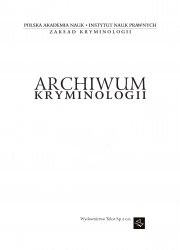O zwalczaniu żebractwa i włóczęgostwa w II Rzeczypospolitej (1918–1939). Studium historycznoprawne
On the Fight against Beggary and Vagrancy within the Second Republic of Poland (1918–1939). A legal and historical study
Author(s): Danuta JanickaSubject(s): Criminal Law
Published by: Instytut Nauk Prawnych PAN
Keywords: criminal law of 19th–20th century;history of criminal law science;combating of beggary;combating of vagrancy;protective measure
Summary/Abstract: The subject of this article is the legal issues related to combating beggary and vagrancy in Poland during the interwar period. The author presents and compares the Russian, Prussian (and later German), and Austrian criminal rules which were in force in Poland in the 19th and early 20th centuries. She clarifies how the partitioning states ordered beggars and vagrants to be punished on Polish land. The author explains that many representatives of the Polish legal doctrine and legal practice expressed the view that these ‘dregs of society’ suffer from psychophysical degeneration. She analyses when and how the issue of begging and vagrancy came to be of interest to the legislature in the Second Polish Republic. The author assesses the anti-begging rules issued in interwar Poland as quite strict and repressive. She presents not only legal provisions and doctrinal views, but also statistical data from 1924–33.
Journal: Archiwum Kryminologii
- Issue Year: 1/2019
- Issue No: XLI
- Page Range: 465-495
- Page Count: 31
- Language: Polish

